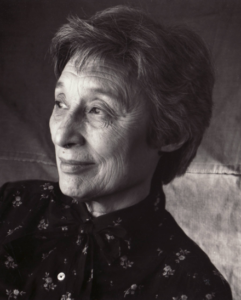Mention ‘Love is a Many-Splendored Thing’ and you might be mistaken for talking about a song from a forgettable 1950s film, but a bestselling novel preceded them both.
An Open University academic has taken a new look at the popular romance A Many-Splendoured Thing that became a worldwide hit for its author Han Suyin.
Professor Alex Tickell, a literary historian and critic at the OU, shared his knowledge of the novel A Many-Splendoured Thing, its writer and world events surrounding it in two episodes of the BBC’s Opening Lines, available on BBC iPlayer.
The series features producer and writer John Yorke who examines the themes and contexts of books, plays and stories aired on Radio 4.

Author Han Suyin
When Han Suyin’s book, A Many-Splendoured Thing, was published in 1952, China had just experienced a brutal civil war and refugees flooded into Hong Kong.
Suyin, born in China to a Belgian mother and Chinese father, studied to be a doctor in war-time London and moved to Hong Kong in 1949 with her daughter when her Chinese military officer husband died.
Soon after, she began a love affair with a married man, an Australian war correspondent who was killed in Korea in 1950.
Suyin wrote the book as she lived and worked in the British colony as a doctor. It’s a semi-autobiographical tale of a love story between a mixed-race woman and a British man set in post-war 1950s Hong Kong.
But Alex says it’s important to realise that shortly before the novel was published, Chairman Mao had just come to power in China and proclaimed the founding of the People’s Republic of China.
Inter-racial love
Beforehand, says Alex: “Suyin’s publisher, Jonathan Cape, reported in 1952 that every woman he saw on a London Tube had a copy underneath her arm or in her bag.
“It chimed with its readership and the text resonated with a generation who had been through the Second World War and we have to remember that it is a love story about two people who are separated by the need to go away to war, so I think in that sense lots of people would have felt a kind of kinship with the protagonist.”
On publication, A Many-Splendoured Thing became a best seller – and its theme of inter-racial love was daring at a time before the American civil rights movement and at the start of Commonwealth immigration to the UK when such relationships were often stigmatised.
Alex said the book “was revolutionary in a way that we don’t recognise now whereas then, it’s quite significant and it’s a love story across a cultural divide.”
Communist China
Mao’s land reform campaign was still to follow, as was The Great Leap Forward in 1958 that led to the Great Chinese Famine killing between 15-55 million people in China. This was followed by the Cultural Revolution of 1966.
Opening Lines discusses how Suyin’s broadly sympathetic view of the new communist China led to the book being out of print for many years after the full details of Mao’s leadership became public.
He continued: “Suyin is really good at evoking the place but also brings a kind of Chinese aesthetics into that.” He describes how she introduced local descriptions of the landscape and skies into the text.
There followed Jung Chang’s hugely popular book Wild Swans: three daughters of China in 1991, an autobiographical account of the difficult lives of three generations of women in China, which was radically different from Suyin’s view of China.
Mao’s reputation ‘savaged’
In “Opening Lines” John Yorke said it “savaged” Chairman Mao’s reputation and Suyin’s depiction of the country.
Alex says: “After Wild Swans, from the early 90s a whole sub-genre of writing developed, which we might call Chinese women’s exile fiction.
“It involves mostly memoirs and biographical fiction accounts set during the cultural revolution of living in China and often escaping to the west.
“This sub-genre creates a new narrative in the West, which is at odds with Han Suyin’s politics, which we know is broadly sympathetic to Maoist China.”
Another reason he says the west’s view of China changed was because of the killing of hundreds of peaceful pro-democracy protesters in Tiananmen Square in Beijing.
Suyin lived until she was 95, dying in her adopted home-town Lausanne, Switzerland. Yet, today, the only places you might be able to get a copy of her book are at your local library or in a second-hand bookshop/bookstall.
Main picture credit: B.N.W. for Pexels



